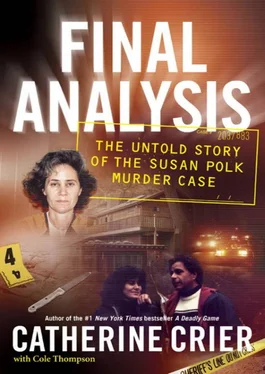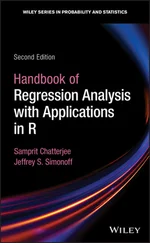In response to questions, Eli portrayed himself as the only one of Susan’s three sons to come to court and “tell the truth,” claiming that his father had hypnotized all three boys during twice weekly therapy sessions at the house. He contended that Felix served them tea and put them in a trance. “I remember not remembering what had happened.” He also believed that Felix was behind the accusations regarding Adam’s sexual abuse by a satanic cult. “It seemed like it was definitely dad’s thing.” And he agreed with his mother that his two brothers were part of a conspiracy to “loot” the Polk estate.
During his final moments on the stand, Eli told jurors that he believed his father’s death could have been prevented if someone had simply reported his abuse to authorities.
“Isn’t it true your dad did try to prevent it and now he’s dead?” Sequeira asked. He reminded Eli that Felix had called authorities several times in the days before his death, saying he was afraid for his life.
“First of all, I believed he attacked her that night, and she defended herself,” Eli argued. It was his contention that Felix was simply trying to set his mother up; that he had “every opportunity” to fix his marriage and had failed miserably.
“Your father’s dead, isn’t he?” Sequeira asked.
“I’m not going to answer that question.”
By late afternoon, Judge Brady had had enough. Susan’s repeated objections and requests to interrupt her son’s testimony with other defense witnesses now seemed like an attempt to keep Eli on the stand—and out of jail—for as long as possible. Brady called an end to Susan’s examination just before 4:30 that Wednesday, directing her to pick up her case in the morning with testimony from Montana real estate agent, Janna Kuntz, and retired forensic pathologist, Dr. John Cooper.
The following morning, Susan’s first witness, Janna Kuntz, testified about conversations she had with Susan in September 2002 while the two were out viewing properties.
“It was not a good marriage,” Kuntz responded to a question from Susan. “You were very unhappy and you wanted to move away, get away.”
The realtor told the court that she was under the impression that Susan’s husband was “a very emotionally abusive human being.”
“Did I express rage?” she asked the realtor, referring to the day she learned Felix had won custody of their Orinda home and their minor son, as well as a significant cut in her support payments.
“I wouldn’t describe it as ‘rage.’ It was more like, ‘Can you believe this? He’s gone and done something again.’”
Under cross-examination, Kuntz agreed that her feelings about the Polks’ marriage were based solely on Susan’s statements. She had never met Felix Polk and could not speak to his character from personal experience. In spite of the one-sided nature of Kuntz’s testimony, her appearance was a relief, as she brought a sense of normalcy to the otherwise chaotic proceedings.
The harmony was short-lived. For her next witness, Susan called Dr. Cooper, a self-employed forensic pathologist from Austin, Texas. Dr. Cooper had reviewed the autopsy report and was in court to dispute the medical examiner’s claims that Felix Polk died as a result of blunt force trauma and bleeding from his extensive injuries. Susan’s former defense attorney, Dan Horowitz, had considered hiring Dr. Cooper when he was in charge of the case, but he opted not to after deciding that the expert witness was a bit of a “kook.”
Susan seemed infatuated by her expert witness, smiling and batting her eyes at the fortyish Texan with the round cheeks, dark hair, and lispy Southern drawl as she stood at the podium. The doctor told jurors that he was an independent forensic expert who was often retained by prosecutors to provide expert testimony at trial. Though he claimed that defense attorneys with “wild theories” often contacted him, he said he usually denied the jobs because “I don’t want to look foolish.” During his career, he performed nearly two thousand autopsies and said he hoped to retire soon to pursue his interest in the medical practices of indigenous cultures.
Dr. Cooper contended that Felix’s heart problems were a “time bomb” and that heart disease, not multiple stab wounds, caused his death. He reached this conclusion after spending more than fifty hours reviewing materials related to the case, including the autopsy conducted by Dr. Brian Peterson, police crime scene photos, grand jury testimony, and letters from Susan that detailed her version of events the night Felix died.
“I believe Dr. Polk died of a coronary event while assaulting his wife,” he testified, noting that the autopsy found that two of Felix’s arteries were 75 percent blocked and his heart was swollen at the time of death.
Dr. Cooper characterized Felix’s stab wounds as “relatively trivial” and claimed they did not cause his death because the “severity of the injuries was really not that great.”
“In your opinion, was my husband killed?” Susan asked, reading from a list of prepared questions she had in front of her on the podium.
“No,” Dr. Cooper affirmed. “I came to the conclusion that the manner of death should be categorized as ‘natural.’
“The stab wounds were not enough for death without the coronary disease. He could have gotten medical attention and survived these injuries,” he concluded.
Rising from his seat in the witness box, the forensic expert strode to the front of the courtroom, his cowboy boots peeking out from beneath dark-colored slacks, and fell to his knees. He was about to provide jurors with a live reenactment of the events of October 13, 2002, as he believed they occurred based on his review of the evidence, and his interpretation was vastly different from that of Dr. Peterson.
Kneeling before the panel, he explained that in order to inflict wounds to Felix’s stomach in the direction they were made, Susan would have to be beneath him, and not standing, when she plunged the knife into his abdomen. Furthermore, Dr. Cooper was critical of Peterson’s findings, particularly his decision to list the exact number of injuries—twenty-seven stab wounds—found on Polk’s body on the autopsy report. It was his contention that Peterson was anxious to dramatize the findings in light of the media attention the Polk case was receiving.
“I would have just said ‘multiple stab wounds,’ because when we fill out these reports we know we’re going to be quoted…. I’ve read the stories in the press.”
“Objection!” Sequeira cut the witness off mid-sentence.
“I’ve read them!” Dr. Cooper shot back, to which the judge issued an admonishment.
Dr. Cooper testified that he found no evidence to support the prosecutor’s claim that Felix was rendered incapacitated early in the struggle by a blow to the head. Holding up a photo of Felix’s head injury, he showed jurors that there was no indication that blood had flowed from the injury to areas of Felix’s neck and back. Blood droplets would be present if Felix had stood up after he sustained the blow, he maintained.
“He hit his head on the tile floor after he fell back from his cardiac arrest,” he concluded.
He testified that Felix’s death was the result of coronary deficiency and that the stab wounds were a contributing factor. This, he asserted, was a clear example of self-defense. Sequeira immediately objected that the witness was not qualified to make a legal assessment. It was one of many objections made by the prosecutor that morning, but his objections never stopped Dr. Cooper from testifying. Ordinarily, a witness stops speaking when a lawyer interrupts; in this case, Dr. Cooper just kept talking. This odd behavior proved quite frustrating for both Sequeira and Judge Brady, who finally called for an early recess.
Читать дальше











